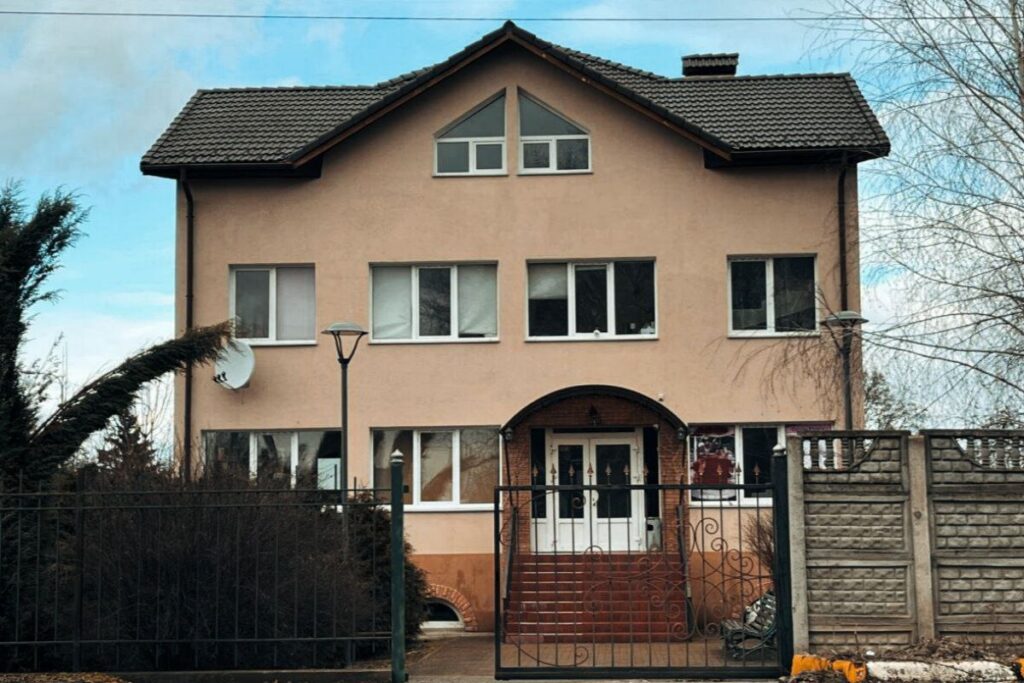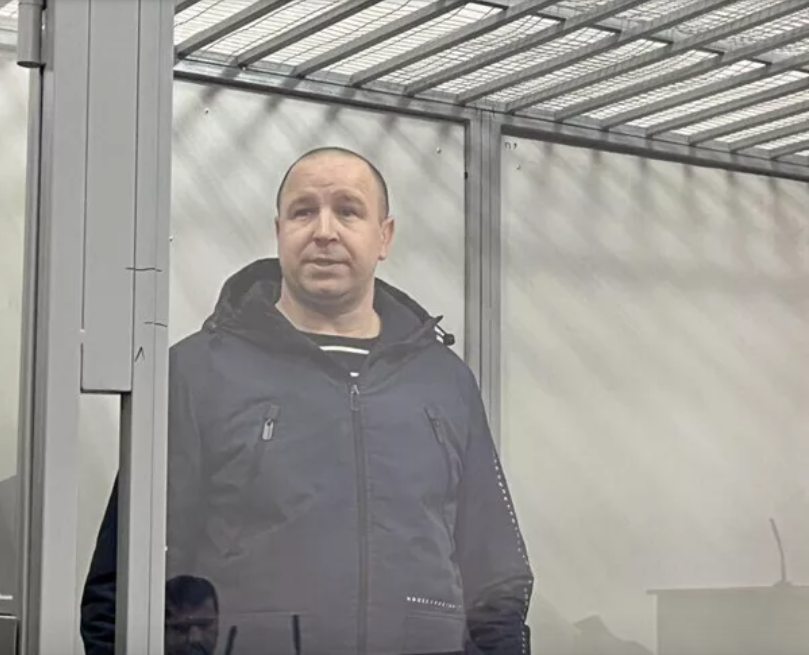In early March 2022, when the village of Syniak in Kyiv Oblast was occupied by Russian troops, the 70-year-old head of the village council, Pavel Eryga, abandoned the community and fled to Belarus (the Russians did not hinder people leaving for Belarus), leaving Vera Mykolaivna Miruta—the mother of local entrepreneur Anatoliy Miruta, who worked as a land surveyor in the village council—with the keys to the basement, a generator, and about 100 liters of gasoline.
In this basement, Miruta organized a makeshift shelter where about 30 people lived constantly, and another 100 regularly came to collect water and charge their phones. After a while, a Russian officer came to the shelter and announced that people could contact Miruta for humanitarian assistance. Over the next few weeks, Anatoliy was involved in transporting sick civilians to the hospital, burials, and distributing Russian humanitarian aid.
In early April, the Russians left the village, and Miruta’s mother was interrogated and gave the SBU (Security Service of Ukraine) lists of recipients of Russian humanitarian aid. She then left Ukraine without waiting for possible arrest. The SBU held Anatoliy for three days in what he described in court as “some kind of basement”; he passed a polygraph test on the third day and was released. However, he was officially detained again in early May and placed in pre-trial detention.

Anatoliy Miruta stated that during the occupation of his village by the Russian Armed Forces, there were no representatives of the Ukrainian state remaining. He stayed at home and organized assistance to his fellow villagers, including providing food, transport for taking the sick to the hospital in a neighboring town, and assistance with burials, as Miruta was in charge of the local cemetery. Naturally, he had to communicate with representatives of the Russian Armed Forces to obtain passes through checkpoints to transport people to the hospital.
The prosecution believes that Anatoliy only created the appearance of helping his fellow villagers, but actually intended to seize power in the village of Syniak. The prosecutor is seeking a 12-year sentence for collaboration. He believes that the defendant “acted as an intermediary between the villagers and the Russian soldiers.” What this means and why it constitutes a crime is not entirely clear. The prosecution stated that “from the end of February and throughout March 2022, during the occupation of the village of Syniak in the Bucha district of Kyiv Oblast, Miruta repeatedly publicly urged residents to cease any resistance to representatives of the Russian Armed Forces, to obey all orders, spread information in support of the aggressor state, and received and distributed humanitarian aid from the aggressor state among the local population.” The calls and dissemination of this information, of course, need to be proven. Witnesses will speak to this below. As for the distribution of humanitarian aid, it is unlikely to constitute a crime.
“Relatives abandoned bedridden people, and I negotiated to provide a green corridor for evacuation and burials. We conducted four burials of civilians because I was still in charge of the cemetery at that time. During the occupation, we used an excavator to dig graves; this was permitted… I traveled by car… how else could we bury people? Carry them to the cemetery by hand?! I traveled to Dymer twice with Russian military escort: from the 8th to the 10th, and once without escort on March 13th. From the 8th to the 10th of March, Stetsyuk, Pashchenko, her sister (also suffering from diabetes), traveled with me… On March 13th, I transported a man who had suffered a stroke and his wife; his neighbor also came along to help load the bedridden man into the car… If we hadn’t started going to Dymer, there would have been at least 10–12 corpses,” said the defendant.
According to him, Russian soldiers delivered humanitarian aid, which his mother and other women sorted for all the villagers, with his mother keeping the lists. He, along with other men, distributed the aid to homes. Some people received it at Miruta’s cafe. Food was prepared from these supplies for those living in the shelter in the cafe’s basement. He did not organize any special gatherings of villagers; people gathered spontaneously. And no one appointed Miruta as the village elder—a Russian soldier simply said that people should contact him regarding food.
The lawyer believes that the evidence presented by the prosecution actually supports the defendant.
All witnesses confirmed that the Russians did not appoint Miruta as the village elder, but simply said that he was “in charge” and that all humanitarian matters could be addressed to him so as not to distract the military. Moreover, it was the villagers themselves, especially those hiding from shelling in the cafe basement, who initiated the appointment of someone “in charge” to address urgent issues.

“The Russian troops brought humanitarian aid… they opened the gates, drove in… Vera Mykolaivna said we didn’t need it. People shouted that they wanted to eat. Maybe you didn’t need it, but we have children, we want… Everyone wanted to eat, everyone wanted to live,” says one of the witnesses.
Only one witness spoke about Miruta’s calls to “support the aggressor state,” and his testimony sounded like this: “During the delivery of humanitarian aid, some people refused to receive it because they didn’t want help from the occupiers, and Miruta reacted negatively to this, saying that they should accept the aid because in 2-3 days the Russians would seize Kyiv.” At that time, the Russian Armed Forces were actively advancing on the Ukrainian capital, and all Ukrainian and foreign media wrote about the possibility of its capture. It is hardly possible to interpret Miruta’s reasoning about the possible outcome of military actions as “support for the aggressor state.” All the testimonies and facts indicate that the defendant provided support to the residents of his native village. Thanks to his actions, many survived.
“Those who allowed the tragedy in Kyiv Oblast should be punished,” the defendant stated in court. “They knew about the offensive from Belarus, but did nothing to protect the residents. The population was not informed how to behave under occupation: to stay or leave. They used the people as a shield, and then accused them of collaborating with Russia. We didn’t have a single Ukrainian soldier or policeman in the village of Syniak. The authorities fled, leaving the people to fend for themselves. So we survived as best we could.”
On February 24, 2023, the court sentenced Miruta to 10 years with confiscation of property, finding him guilty of collaborationist activity, which consisted of “organizing and conducting political events, carrying out information activities in cooperation with the aggressor state, aimed at supporting the aggressor state, its armed formations, and avoiding responsibility for armed aggression against Ukraine” (Part 6, Article 111-1 of the Criminal Code of Ukraine).
The appeal process began in October. The defense attorney argues that the trial court failed to properly evaluate key witness testimony. The verdict selectively included only fragments of statements supporting the prosecution’s case.Other testimony was dismissed in a single generalized sentence, while some was omitted entirely. A number of testimonies seem dubious. For example, the prosecutor brought a couple of previously unknown witnesses to court a month before the trial ended. They testified that they saw Miruta repeatedly bringing Russian soldiers to their neighbor’s house for milk. How did they know it was for milk? The neighbor told them. The defense requested that the neighbor be questioned, but she refused to appear in court – claiming she knew nothing and saw nothing. The court refused to compel the woman’s attendance because the lawyer lacked her passport details. At the time of publication, the appeal process is ongoing.
This translation was made using a neural network. If you find any inaccuracies, please contact us.


